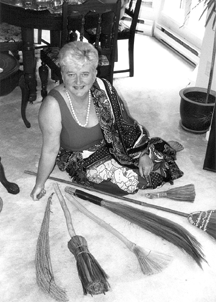

 It's no wonder that Inge Andreen is
It's no wonder that Inge Andreen is
only the second person to receive the Canadian Association of Community Educators
(CACE) Research Award in 14 years.
This cheerful, high-energy professional has criss-crossed Canada and the globe on a serious education mission to communicate the concept of community-based education.
In the process, Andreen, an assistant professor in UBC's Dept. of Curriculum Studies, has made a big difference in poor communities in Canada, Thailand, Malaysia, Vietnam, China, India, Africa, Costa Rica and the Caribbean.
In community-based education, the school is the centre of a community and it is responsible for the learning and teaching of everyone who lives there, no matter what age. Inclusion is the heart of Andreen's education philosophy.
"This means that all learners should be at the table," she says. "Everyone in the school and the community, should be involved in making decisions about their school and learning and working together to make their community a better place."
Andreen became interested in community-based education in 1976 after seeing community schools in action in Vancouver.
"I realized these schools embraced my philosophy of teaching and learning in living colour," she says.
A year later she became involved as a professor in the Community Education Teacher Education Program in the Faculty of Education.
Before she sets off to a new location, Andreen does what she calls `front-end loading.'
"I learn about the place, the interests of the people and who will be involved so I won't be walking in blind," she says.
Sitting in her small cluttered office in the Scarfe building, Andreen rifles through a mountain of books, papers and photographs to illustrate her points.
In a tiny remote community of 300 people on Newfoundland's south coast in which Andreen worked there was no village centre and no shops. The only local businesses included some farmers, a few contractors, a potter and a weaver.
The Belange Memorial School was the centre for residents who were scattered throughout the area. The school was near a wetlands area and that became the focus of Andreen's approach. Taking eco-tourism as the starting point, Andreen used the school to address the community's number one problem -- 70 per cent unemployment.
"The idea is to show the community how they can stay in their community and earn a living with what they have around them," she says.
She introduced the school's teachers to on-going field studies. Students drew birds in the wetlands and studied their habits. It was their job to design walkways to protect the flora and fauna while taking advantage of the best views to attract visitors.
The students began to organize pioneer games to further enhance the attraction for tourists. Teachers had to learn the skills needed to work with volunteers of all ages.
"It's a concept where science and social issues get together," she says. "You take traditional subjects, such as math and social studies and weave them into a common theme that solves common issues."
From the outports of Newfoundland to the jungles of Costa Rica, Andreen thoroughly enjoys seeing communities develop, grow and thrive.
"It's a real challenge because each community is so different", she says.
In a remote Costa Rican jungle community, the challenge was safe drinking water.
"Waste water was boiled for drinking. They had no idea it was dangerous," she says. "In the school we told teachers and the students that diseases are caused by dirty water. Everyone -- young children and adults -- helped to build the water pumps."
And wherever she goes, Andreen tries to emphasize the role of women.
"As I get older I get more impatient when women are not recognized for the role they play in the community," she says. "I make a point of talking on birth control and parenting. It all has to be a community vision."
That's not always welcome with male officials in developing countries, but Andreen talks about it anyway. And sometimes a respected foreign visitor can get the attention of the powers-that-be to help pave the way for local women.
Such was the case in Vietnam during a 3-week session on community-based schools. One of the few women in the Vietnamese government was so grateful she insisted Andreen accept a beautiful string of carved ivory beads that had been in her family four generations.
Andreen has also found appreciative women in the Caribbean islands of Nevis, Dominica, Barbados, Grenada and Guyana on the South American mainland.
That's the good part. Andreen has also experienced frustration.
"Usually the most disappointing thing is the tendency of governments to send totally unsuitable people to the training sessions or conferences," she says.
And there's been some risk.
During a trip to Myanmar, Andreen posed as a tourist with her two children in order to spend five days in clandestine meetings with 20 teachers explaining the concept of community-based schools.
"People were receptive to the idea that women and elders should play a role. But if the military regime had found out, I would have been in big trouble," she says.
After teaching at UBC for 34 years and winning UBC's Killam Teaching Prize, Andreen will formally retire from UBC on the last day of the century, Dec. 31, along with her sister, Dr. Peggy Ross, who is an associate dean of Medicine at UBC. Andreen says she is ready. But journeys to the far corners of the earth to impart the usefulness of community-based education will continue.
"It's my volunteer work," she says. "I see myself as a teacher. And community-based education offers all of the challenges of being a good teacher -- of knowing who your audience is and selling them on their ability to provide a vision for their community," she says.